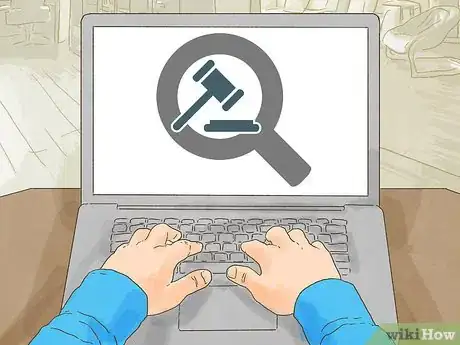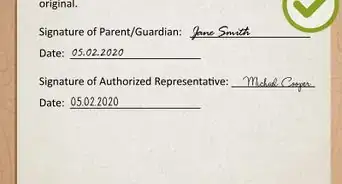This article was written by Jennifer Mueller, JD. Jennifer Mueller is an in-house legal expert at wikiHow. Jennifer reviews, fact-checks, and evaluates wikiHow's legal content to ensure thoroughness and accuracy. She received her JD from Indiana University Maurer School of Law in 2006.
There are 13 references cited in this article, which can be found at the bottom of the page.
wikiHow marks an article as reader-approved once it receives enough positive feedback. In this case, 94% of readers who voted found the article helpful, earning it our reader-approved status.
This article has been viewed 48,964 times.
The confidentiality of your medical records is protected by the federal Health Insurance Portability and Accountability Act (HIPAA). However, if your medical privacy is violated, you can't sue in federal court under HIPAA. To sue for medical privacy violations, you must file a lawsuit for invasion of privacy or breach of doctor-patient confidentiality under your state's laws. Because of the complexity of these claims, your first step should be to consult with a licensed attorney who has experience in medical privacy law.[1]
Steps
Hiring an Attorney
-
1Search for attorneys in your area. You can start your search by visiting the website of your state or local bar association. They typically have searchable directories of licensed attorneys that you can use to find someone with the expertise and experience you need.[2] [3]
- If you have any friends or relatives who have recently been involved in similar lawsuits, you might ask them if they would recommend the attorney they used.
- However, keep in mind that every case is different, and just because a particular attorney worked well for someone you know doesn't mean they'll work well for you.
- You also can find attorneys by using a private online directory service. These services often provide profiles of attorneys as well as reviews from clients.
- Focus on attorneys who have experience in medical malpractice as well. Your state's medical malpractice statute may provide a cause of action for medical privacy violations.
- Once you have a list of attorneys, visit their websites to learn more about their practice areas and experience.
-
2Gather information about your case. Before you speak to any attorneys, you should construct a summary and basic timeline of what happened and how you believe your medical privacy was violated. You also will need to be able to identify the individuals or entities you allege violated your medical privacy.[4] [5] [6]
- Doctor-patient confidentiality is protected by state law. That confidentiality is breached if your private medical information is disclosed to a third party without your consent. You would use this theory to sue for a medical privacy violation if your doctor was the person who disclosed the information.
- In other situations, such as if the information was disclosed by an employee of your health insurance company, you might sue for invasion of privacy. An invasion of privacy lawsuit also would be appropriate if the information was revealed publicly.
- To prepare for your initial consultations, you should have as much information as possible regarding who disclosed your information, when, how, and to whom.
Advertisement -
3Schedule initial consultations with several attorneys. Since many attorneys are willing to take cases involving invasion of privacy on contingency, you typically can get a free initial consultation. Talking to several attorneys allows you to compare and contrast to find the best attorney to handle your case.[7]
- Based on your research, you should be able to come up with at least two or three attorneys near you who have experience in medical privacy law. Call their offices and schedule an initial consultation, leaving at least an hour for the meeting itself plus reasonable travel time.
- If the attorney requests specific information about you or your case before the appointment, make sure you send the correct documents well in advance of the date the consultations is scheduled so the attorney has enough time to prepare for the interview.
- You also should come prepared with a list of questions for the attorney. Especially with free consultations, this initial meeting may seem more like a sales pitch for the attorney than a discussion of your case.
- Ask questions about the attorney's experience, practice, and work habits, focusing on what would be important to you in a close working relationship.
- For example, if it's important to you that your emails or phone calls are answered promptly, you will want to ask the attorneys questions about their communication style and how promptly they respond to queries from clients.
-
4Make your final choice. After you've interviewed several attorneys, assess your needs and your goals for your lawsuit. Compare the strengths and weaknesses of the attorneys to determine which of them is best able to meet your needs and fulfill your goals.[8] [9]
- While you want to use the attorney who has the most experience and knowledge of medical privacy violations, it's also important for you to be comfortable with the attorney as a person.
- By nature of the lawsuit itself, you will have to talk about private matters with your attorney. The best attorney for you will be someone with whom you're comfortable and at ease, even if he or she has less experience than another attorney you've interviewed.
- Once you've chosen the attorney you want, call the others and let them know you've decided to go with someone else.
- Meet with your chosen attorney as soon as possible and get a retainer agreement in writing. Often attorneys will handle medical privacy lawsuits on contingency, but you need a breakdown of exactly what percentage of any award or settlement the attorney will take, and how he or she will account for court costs and other expenses.
Initiating Your Lawsuit
-
1Work with your attorney to draft your complaint. The complaint is the document you will file with the court to start your lawsuit. It identifies you and the people or entities you're suing and contains a list of factual allegations that constitute a violation of a law that entitles you to monetary damages.[10] [11]
- The biggest difficulty with lawsuits for medical privacy violations is proving damages. Your attorney will need documentation such as medical bills or receipts, mental health counseling bills, and lost time from work.
- If the violation was such that you were compelled to purchase credit protection or identity theft insurance, those costs also can be included in your damages.
- While you don't need to include any of this documentation with the complaint itself, your attorney will want to include a figure for damages that he or she can defend if challenged.
- Your attorney also will work with you to figure out who you need to sue. While an individual person may have been responsible for disclosing your private information, it's likely that person was employed by your doctor, or by a hospital or health insurance company. Typically the person's employer would need to be named as a defendant as well.
-
2File your complaint. Once your complaint is finished, you and your attorney must take it to the clerk of the court you want to hear your lawsuit. The clerk will file your complaint and assign your case to a judge.[12]
- The clerk will charge a filing fee of several hundred dollars for your lawsuit. If your attorney is working on contingency, they'll pay those fees and add them to the expenses that will be taken from any settlement or award.
- Typically you will receive a file-stamped copy of the complaint for your records. Keep this and all other court documents related to your case in a safe place.
-
3Have the defendants served. After you've filed your complaint, it must be delivered to the people or entities you're suing so they have sufficient legal notice of the lawsuit against them and the opportunity to respond.[13]
- Your attorney will take care of the service. Typically a sheriff's deputy hand-delivers a summons and a file-stamped copy of the complaint to the individual or the designated agent of the healthcare provider you're suing.
- The summons tells the defendants how long they have to respond to the lawsuit and where they should file their response.
-
4Receive the defendants' answer. After the defendants are served with your complaint, they have a limited period of time to file a written response to your lawsuit with the court – typically 20 or 30 days. They may file an answer which responds directly to the allegations in your complaint.[14] [15]
- In a medical privacy violation lawsuit, you can expect the answer to deny most, if not all, of your allegations. If the answer is coming from a business entity, such as a health insurance company or a hospital, it may state that the defendant lacks sufficient information to either admit or deny the allegations. This response is treated by the courts as a denial.
- When a defendant denies the allegations in your complaint, this means you must prove that the facts contained in the allegation are more likely than not true. On the other hand, if a defendant admits an allegation, that means you don't have to prove it at all.
- Don't be surprised if your defendants also file a motion to dismiss, or a motion for summary judgment. These documents ask the court to rule that even if all the facts contained in your complaint are true, they don't add up to anything for which you can sue and get money.
-
5Consider any settlement offers. Upon receipt of your complaint, the defendants may send you an offer to settle the case without going to court. If the defendants filed a motion to dismiss, they typically will wait until after that motion is heard by the judge.[16] [17]
- If you sued under your state's medical malpractice law, your doctor would be covered by his medical malpractice insurance company. Insurance companies often send a settlement offer as soon as they receive a complaint, in an effort to get rid of the case as quickly as possible.
- Keep in mind the initial settlement offer probably will be very low. It might even be a fraction of the amount you've demanded in your complaint.
- Your attorney will advise you on whether you should accept, decline, or counter the offer – but keep in mind the final decision is yours alone.
Litigating Your Case
-
1Conduct written discovery. Through interrogatories and requests for production, both parties have the opportunity to exchange written answers to questions and copies of documents related to the lawsuit.[18]
- The defendants most likely will send interrogatories to your attorney that you will have to answer. Your attorney will go through these questions with you and discuss the responses.
- Because there also are legal responses – for example, your attorney may object to certain questions as beyond the scope of the lawsuit – your attorney typically will prepare the written answers after talking to you.
- Particularly if you've named a healthcare or insurance company as a defendant, any requests for production sent by your attorney may result in mountains of documents that must be sifted through to find possible evidence.
-
2Depose the defendants and key witnesses. The other aspect of the discovery process consists of live interviews which are conducted under oath in the presence of a court reporter. You (through your attorney) ask parties and witnesses about their actions and knowledge of the facts in your case.[19]
- In particular, you will want to depose the individual who was directly responsible for disclosing your private information and violating your privacy. You want them on record regarding the disclosure and their knowledge and understanding of the fact that they were violating your privacy, or disclosing the information without your knowledge and consent.
- The defendants also may want to depose you regarding your understanding of the disclosure and the damages you suffered as a result.
-
3Attend any pretrial hearings or conferences. Throughout the course of pretrial litigation, the parties may file motions to ask the judge to rule on various aspects of the case, such as to order one party to produce documents or evidence.[20] [21]
- As the plaintiff, you typically don't have to attend scheduling conferences, or hearings that relate to purely procedural motions. Your attorney will send you a letter summarizing what happened.
- If a motion is filed at any time that requires your presence in court, for example to testify, your attorney will let you know.
-
4Participate in mediation. In mediation, a neutral third party facilities a discussion with the parties in an attempt to reach a settlement. Many courts require civil litigants to at least attempt to resolve their dispute through mediation before a trial is scheduled.[22]
- Healthcare providers and insurance companies may prefer mediation because the process is confidential. A public trial can be damaging to the company from a public relations standpoint, and also can inspire other potential plaintiffs to file similar lawsuits against them.
- However, you should keep in mind that mediation also is a voluntary process. Even if participation is mandated by the courts, it is not mandatory that you arrive at a settlement.
- In the event you are able to settle the claim, the mediator typically will write up the terms of the settlement in a written agreement that will be signed by all parties.
- Once signed, the settlement agreement becomes a legally enforceable contract.
-
5Prepare for trial. If you are unable to reach settlement independently or through mediation, a trial will be scheduled for you to present your case to a judge or jury. You must work with your attorney to build your case and develop a strategy.[23]
- In most cases, your attorney will prefer a trial by jury. Particularly in medical malpractice and medical privacy violation lawsuits, jurors will be far more sympathetic to you than they will be to the defendants – particularly if you're suing a large insurance company.
- Your attorney will meet with you several times to go over what you can expect at trial. If you will be testifying, your attorney likely will practice with you the questions you'll be asked, as well as possible questions you could be asked by the defense attorneys on cross examination.
- Keep in mind that even if you were unable to settle your case in mediation, the defendants may continue to make settlement offers, especially as the trial date draws closer.
References
- ↑ http://healthcare.findlaw.com/patient-rights/what-can-i-do-after-an-improper-disclosure-of-medical-records.html
- ↑ http://healthcare.findlaw.com/patient-rights/what-can-i-do-after-an-improper-disclosure-of-medical-records.html
- ↑ http://journal.ahima.org/2011/03/01/hipaa-violation-sue-me/
- ↑ http://healthcare.findlaw.com/patient-rights/what-can-i-do-after-an-improper-disclosure-of-medical-records.html
- ↑ http://injury.findlaw.com/torts-and-personal-injuries/invasion-of-privacy.html
- ↑ http://injury.findlaw.com/medical-malpractice/breaches-of-doctor-patient-confidentiality.html
- ↑ http://www.nolo.com/legal-encyclopedia/find-lawyer-how-to-find-attorney-29868.html
- ↑ http://www.nolo.com/legal-encyclopedia/find-lawyer-how-to-find-attorney-29868.html
- ↑ http://www.thehealthlawfirm.com/resources/health-law-articles-and-documents/Remedies-for-Violation-of-HIPAA-Privacy-Rights-and-Medical-Confidentiality.html
- ↑ http://www.americanbar.org/groups/public_education/resources/law_related_education_network/how_courts_work/cases_pretrial.html
- ↑ http://www.thehealthlawfirm.com/resources/health-law-articles-and-documents/Remedies-for-Violation-of-HIPAA-Privacy-Rights-and-Medical-Confidentiality.html
- ↑ http://www.americanbar.org/groups/public_education/resources/law_related_education_network/how_courts_work/cases_pretrial.html
- ↑ http://www.americanbar.org/groups/public_education/resources/law_related_education_network/how_courts_work/cases_pretrial.html
- ↑ http://www.americanbar.org/groups/public_education/resources/law_related_education_network/how_courts_work/cases_pretrial.html
- ↑ http://www.americanbar.org/groups/public_education/resources/law_related_education_network/how_courts_work/pleadings.html
- ↑ http://journal.ahima.org/2011/03/01/hipaa-violation-sue-me/
- ↑ http://www.injuryclaimcoach.com/medical-malpractice-insurance-company.html#
- ↑ http://www.americanbar.org/groups/public_education/resources/law_related_education_network/how_courts_work/discovery.html
- ↑ http://www.americanbar.org/groups/public_education/resources/law_related_education_network/how_courts_work/discovery.html
- ↑ http://www.americanbar.org/groups/public_education/resources/law_related_education_network/how_courts_work/pretrial_conference.html
- ↑ http://www.americanbar.org/groups/public_education/resources/law_related_education_network/how_courts_work/motions.html
- ↑ https://www.justice.gov/sites/default/files/olp/docs/pa-mid.pdf
- ↑ http://journal.ahima.org/2011/03/01/hipaa-violation-sue-me/
- ↑ http://www.thehealthlawfirm.com/resources/health-law-articles-and-documents/Remedies-for-Violation-of-HIPAA-Privacy-Rights-and-Medical-Confidentiality.html





































































